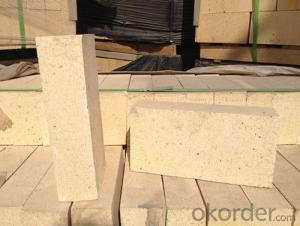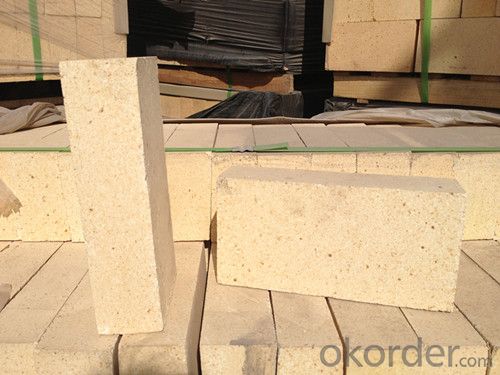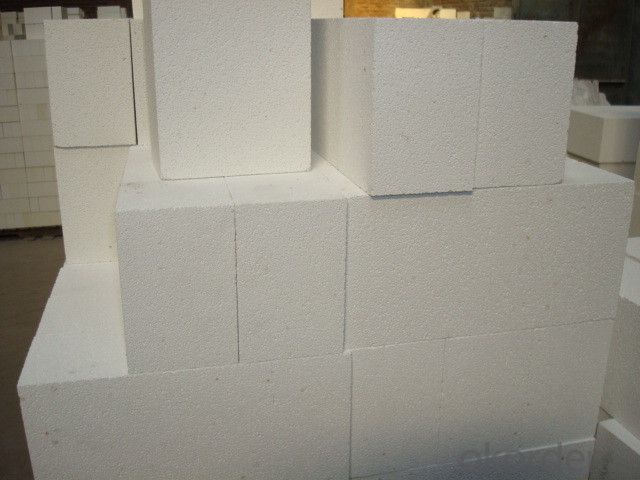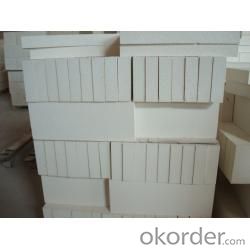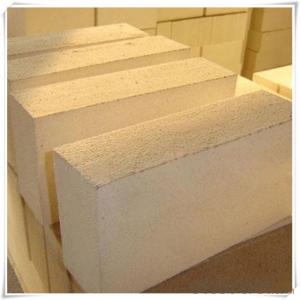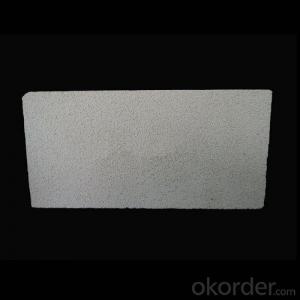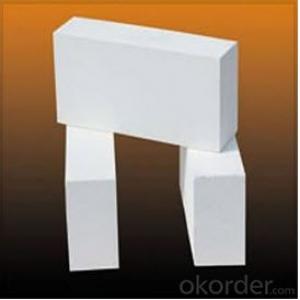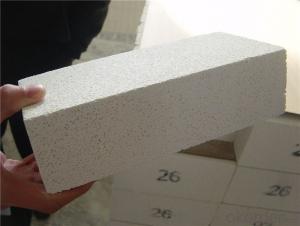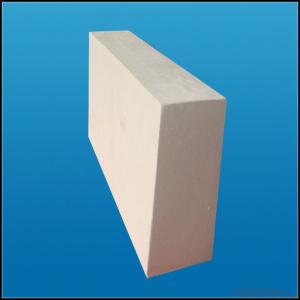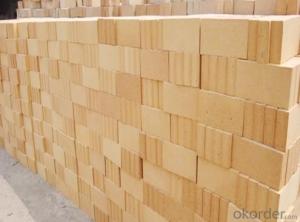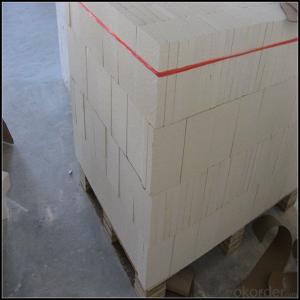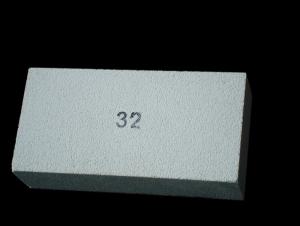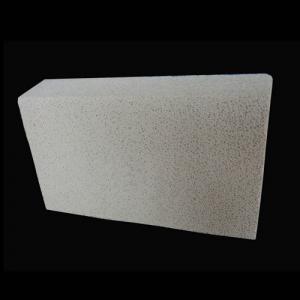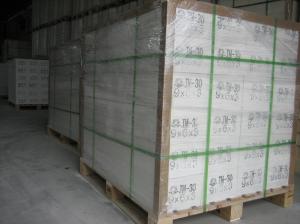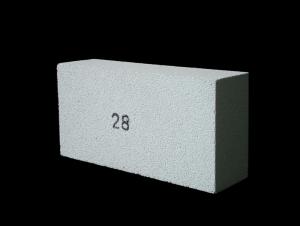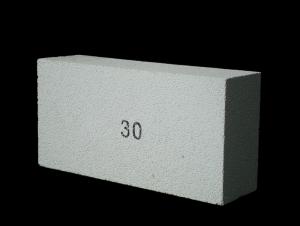Insulating Fire Brick - SK32, SK34, SK36, SK38
- Loading Port:
- China main port
- Payment Terms:
- TT OR LC
- Min Order Qty:
- 20 roll
- Supply Capability:
- 10000 roll/month
OKorder Service Pledge
OKorder Financial Service
You Might Also Like
CNBM conforms strictly to the requirements of ISO 9000 quality control system during the production. MSDS is also available if you want. The thermal insulation fire clay brick meet with the requirements of ASTM & JIS standards. So pls stay cool with our quality.
Insulating Fire Brick Technical index
Product No. | IFB70 | IFB60 | IFB50 | IFB40 |
Al2O3 | 68%-72% | 58%-62% | 48%-52% | 38%-40% |
Refractoriness (°C ) | ≥1790 | ≥1790 | ≥1790 | ≥1790 |
Bulk density (g/cm3) | 2.50-2.60 | 2.35-2.45 | 2.20-2.30 | 2.10-2.20 |
Apparent porosity (%) | 22 | 19-22 | 17-20 | 17-20 |
Cold Crushing strength (kg) | 480-510 | 450-480 | 430-450 | 390-430 |
Application
Insulating Fire Brick are used for the lining of converter, alternating current arc furnace, direct Current arc furnace and the ladle slag line, etc.
Equipment
1 unit of Ceramic Abrasive (SG Abrasive) pilot production line
2 units of Compact grain Abrasive pilot production lines
1 unit of high-end coated abrasives (abrasive cloth) production line
2 units of Boron Carbide production lines
3 large flexible crushing and sieving lines for grit production lines
2 units of 2000KVA furnaces for Boron Carbide fusion
6 units of 5000KVA-10000KVA dumping type electric arc furnaces for Brown Fused Alumina fusion
Company Advantage
(1)Long Insulating Fire Brick manufacture history: 25 years manufacturer
(2)Advanced equipment
(3)Diversification of production standards: ISO ANSI FEPA JIS ASTM
(4)Flexible payment: T/T L/C D/P D/A
(5)Professional marketing team and after-sale service
(6)Free sample
FAQs
Q1 |
What’s the transport method? |
A1 | FCL delivery goods with wooden pallet or wooden case by sea; If LCL delivery, must with wooden case; Sometimes need open top, flat rack or bulk cargo. |
Q2 |
What’s the required payment term? |
A2 | Generally 30% TT as the prepayment, 70% TT before delivery. If need, 100% Irrevocable Letter of Credit or negotiation. |
Q3 |
Which country are our products exported to? |
A3 | Apart from entire Chinese market, the US, Russia, Japan, Korea, Australia and some Southeast Asian Nations. |
- Q: Are insulating fire bricks resistant to sulfates?
- Insulating fire bricks are generally resistant to sulfates. These bricks are made of high-alumina or silica materials, which have good chemical resistance properties. Sulfates are a type of chemical compound that can react with certain materials and cause degradation. However, insulating fire bricks are designed to withstand high temperatures and harsh chemical environments, including exposure to sulfates. They are often used in applications such as furnaces, kilns, and incinerators where they may come into contact with sulfates. Nevertheless, it is important to consider the specific composition and quality of the insulating fire bricks, as well as the concentration and duration of sulfate exposure, to ensure their long-term performance and durability.
- Q: How do insulating fire bricks affect the overall insulation efficiency of a process?
- Insulating fire bricks play a crucial role in enhancing the overall insulation efficiency of a process. These bricks are specifically designed to have low thermal conductivity, which means they are excellent at resisting heat transfer. This property helps to minimize the loss of heat energy and maintain a consistent and controlled temperature within the process. By using insulating fire bricks, the amount of heat that escapes from the process is significantly reduced. This leads to better energy conservation and ultimately, increased insulation efficiency. The bricks act as a barrier, preventing the conduction of heat through the walls, floors, or other components of the process equipment. This is especially important in high-temperature applications, where heat loss can be substantial. Furthermore, insulating fire bricks are capable of withstanding high temperatures without deteriorating or melting. This means they can effectively insulate the process even when exposed to extreme heat conditions. Their durability ensures long-lasting performance and reliable insulation over time. Another advantage of using insulating fire bricks is their lightweight nature. Compared to traditional dense bricks, they have a lower density, which reduces the overall weight of the equipment or structure. This not only simplifies the construction process but also minimizes the load on supporting structures. In summary, insulating fire bricks contribute to the overall insulation efficiency of a process by reducing heat loss, maintaining a controlled temperature, and providing long-lasting insulation capabilities. Their low thermal conductivity, high-temperature resistance, and lightweight properties make them an ideal choice for various industrial applications where energy conservation and efficient insulation are essential.
- Q: Can insulating fire bricks be used in the construction of thermal insulation floors?
- Insulating fire bricks are indeed suitable for the construction of thermal insulation floors. These bricks are specifically designed to possess low thermal conductivity, enabling them to effectively impede heat transfer. Consequently, they are an excellent selection for thermal insulation purposes, including floors. The utilization of insulating fire bricks in the construction of thermal insulation floors can greatly decrease heat loss from the floor, resulting in enhanced energy efficiency and cost savings. Furthermore, these bricks are lightweight and easy to install, making them a practical option for construction projects. All in all, insulating fire bricks offer a suitable and effective means of incorporating thermal insulation into floors.
- Q: Can insulating fire bricks be custom-made?
- Yes, insulating fire bricks can be custom-made to meet specific requirements and dimensions.
- Q: Are insulating fire bricks suitable for use in carbon black furnaces?
- Yes, insulating fire bricks are suitable for use in carbon black furnaces. These bricks are known for their high insulation properties, which help in maintaining high temperatures inside the furnace while preventing heat loss. Additionally, insulating fire bricks are designed to withstand extreme temperatures and chemical reactions, making them a suitable choice for carbon black furnaces that operate under high heat and harsh conditions.
- Q: Is it possible to repair damaged insulating fire bricks?
- Yes, it is possible to repair damaged insulating fire bricks. The extent and type of damage will determine the repair method required. For minor cracks or chips, a suitable refractory mortar can be used to fill in the gaps and restore the brick's integrity. This mortar is designed to withstand high temperatures and provide a strong bond. If a larger section of the brick is damaged or missing, it may be necessary to replace the entire brick. In this case, the damaged brick can be carefully removed and a new one can be installed using the appropriate refractory mortar. It is important to note that the repaired or replaced brick should match the original specifications and quality to ensure proper insulation and structural integrity. It is recommended to consult with a professional or follow the manufacturer's guidelines for the specific repair process.
- Q: Are insulating fire bricks resistant to warping?
- Yes, insulating fire bricks are resistant to warping. They are specifically designed to have high thermal stability and low thermal conductivity, which helps to prevent warping even under high temperatures.
- Q: Do insulating fire bricks provide sound insulation as well?
- No, insulating fire bricks are primarily designed to provide thermal insulation and are not specifically designed for sound insulation.
- Q: Can insulating fire bricks be used in power plants?
- Yes, insulating fire bricks can be used in power plants. These bricks are designed to withstand high temperatures and provide excellent insulation, making them suitable for various applications in power plants, such as lining furnaces, boilers, and kilns. Insulating fire bricks help to conserve energy, improve efficiency, and maintain a stable temperature within power plant equipment.
- Q: Are insulating fire bricks suitable for use in the construction of drying ovens?
- Yes, insulating fire bricks are suitable for use in the construction of drying ovens. Insulating fire bricks are designed to have low thermal conductivity, which means they can effectively retain heat within the oven. This property is especially important in drying ovens as it helps to maintain a consistent and even temperature throughout the drying process. Additionally, insulating fire bricks have high resistance to thermal shock, meaning they can withstand the rapid temperature changes that may occur during the heating and cooling cycles of the oven. This durability ensures that the bricks will not crack or break under extreme temperature conditions. Furthermore, insulating fire bricks are lightweight and easy to handle, making them convenient for installation in drying ovens. Overall, these bricks provide excellent insulation and thermal stability, making them a suitable choice for the construction of drying ovens.
Send your message to us
Insulating Fire Brick - SK32, SK34, SK36, SK38
- Loading Port:
- China main port
- Payment Terms:
- TT OR LC
- Min Order Qty:
- 20 roll
- Supply Capability:
- 10000 roll/month
OKorder Service Pledge
OKorder Financial Service
Similar products
Hot products
Hot Searches
Related keywords
